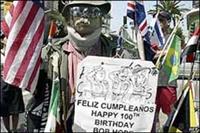 Homeless veterans recognized for contributions to their country
Homeless veterans recognized for contributions to their country
By Bruce Shreiner
LOUISVILLE, Ky. – As a young soldier, Ronnie Richardson manned a dangerous outpost near the Demilitarized Zone separating North and South Korea.
Now in his 50s, the Army veteran has no job and drifts between homeless shelters and friends’ homes to keep out of the bitter Kentucky cold.
Richardson was among a group of down-on-their-luck veterans recognized Tuesday at an inner-city shelter for serving their country, even as homeless advocate Marlene Gordon flatly told them that “America has failed you.”
Gordon, executive director of the Louisville Coalition for the Homeless, estimated that nearly 1 in 5 of the city’s homeless once served in the military – a statistic she called “unconscionable.” She called for more affordable housing, improved wages and expanded health care to tackle the problem.
“The military says we won’t leave soldiers behind on the battlefield, but yet we don’t mind leaving them in the gutters of our country,” Gordon said. “It’s really wrong.”
Some homeless veterans, however, expressed no bitterness toward the government they once served, and blamed themselves for their plight.
“If you really want help, it’s out there to be taken,” said Richardson, who served in the Army from 1972 to 1974, including a stint in Korea.
Nationally, an estimated 200,000 military veterans are homeless on any given night, representing nearly a quarter of the nation’s adult homeless population, according to the U.S. Department of Veterans Affairs. Also, a third of all men living on the streets are veterans, it said.
At the Jefferson Street Baptist Center, dozens of homeless men stood to recite the Pledge of the Allegiance during a short ceremony. They listened to speakers praise their brethren who once took up arms to defend America.
“When their country needed them, they were there,” said George Lee Jr., director of a local veterans-support group. “They guarded our liberties, they guarded our freedoms. And now when they need their country, we need to show awareness, that we have veterans that this country is not taking care of.”
Each homeless man received a sleeping bag and a backpack filled with nonperishable food items, donated by Titan Research and Development, which manages a sprawling industrial park in South Louisville.
“The country’s attention is focused outward now, on the things that are happening overseas,” said Titan development manager George McDermott. “It’s really necessary to focus inward as well, to the people who have already served and help them in their time of need.”
Citywide, shelters were full Tuesday amid forecasts of up to nearly a half-foot of snow and single-digit temperatures later in the week. Homeless advocates were opening makeshift space in chapels, dining halls and elsewhere to accommodate the extra numbers seeking shelter.
As he clutched his gifts, Richardson called the donations “a blessing.”
After leaving the military, Richardson worked a variety of jobs, including construction, landscaping and plumbing. Now he’s jobless, but draws a government disability check. He flatly said veterans shouldn’t be living on the streets.
Still, Richardson, 53, didn’t blame anyone else for his predicament. He said he plans to attend a church-based program to “get back on the right track.”
“I can’t knock nobody but myself because if you want something, you’ve got to get up off your rear end and go for it and get it,” he said. “Because there are plenty of opportunities and options that we can take. Sometimes we take the wrong one and we take the right one. Me, I think I took the wrong one.”
The VA says it provided health care services to about 100,000 homeless veterans last year, and more than 74,000 were assisted by specialized programs. Among the programs are clinical assessments and referrals for medical treatment, long-term transitional residential assistance and employment assistance.
Earl Blackmon, who joined the Army at age 17 and served in Grenada, Panama and the Gulf War, said he, like many veterans, had trouble adjusting to civilian life.
“When you come from a controlled environment like the military that instills these good values, and you come into a civilian populous … it’s so uncontrolled,” he said. “Some veterans don’t know how to handle that.”
Blackmon, 41, said he has been homeless for four years and has no income, but has applied for government disability checks. He said he has been treated for post-traumatic stress disorder, which he blamed for his descent into homelessness.
Still, Blackmon’s faith remained intact. He said he has been drug- and alcohol-free for more than two months, and aspires to attend seminary.
“Things were going downhill, but it’s working out,” he said. “Things are a lot better today.”
ATTENTION READERS
We See The World From All Sides and Want YOU To Be Fully InformedIn fact, intentional disinformation is a disgraceful scourge in media today. So to assuage any possible errant incorrect information posted herein, we strongly encourage you to seek corroboration from other non-VT sources before forming an educated opinion.
About VT - Policies & Disclosures - Comment Policy



